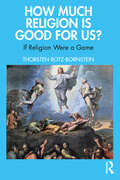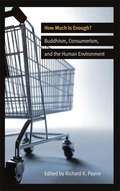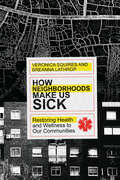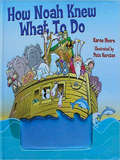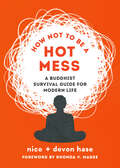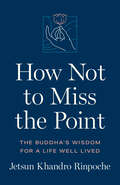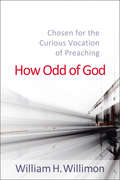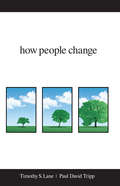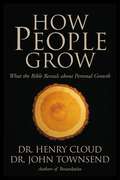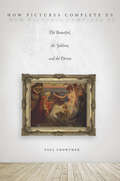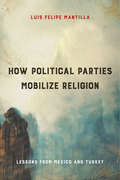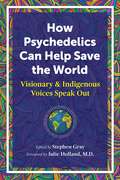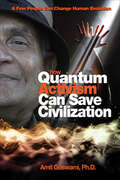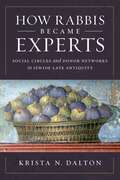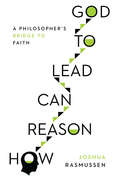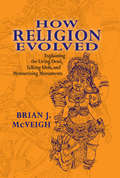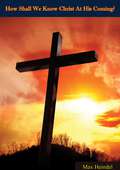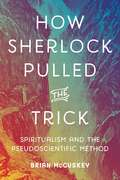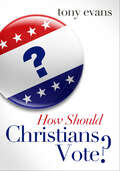- Table View
- List View
How Much Religion is Good for Us?: If Religion Were a Game
by Thorsten Botz-BornsteinHow Much Religion is Good for Us? is a provocative book which examines parallels between play and religion from a philosophical, theological, and anthropological perspective.Understanding “religion as a game” in the context of secular culture, it explores the “playful” patterning of spiritual and religious belief in modern societies. Drawing on the Nietzschean concept of a dead but powerful God, the book depicts modern civilizations as players treading a secular age in which the spirit of religion unconsciously survives. It argues that the spirit of religion is preserved in cultures in the form of a spiritual game, distilling moral precepts and imperatives much like poetry and works of art do. Comparative in scope, it references Christianity, Buddhism, Islam, Sufism, and Daoism.This interdisciplinary volume is an outstanding resource for students and scholars of Religious Studies, Islamic Studies, Cultural Studies, Philosophy, and Anthropology.
How Much is Enough?
by Richard K. PayneThe massive outpouring of consumer products available today might alone lead one to ask "How much is enough?" But at the same time, if we allow ourselves to see the social, political, economic and environmental consequences of the system that produces such a mass of "goods," then the question is not simply a matter of one's own personal choice, but points to the profound interconnectedness of our day to day decisions about "How much is enough?" The ease with which we can acquire massive quantities of food, clothing, kitchenware, and various electronic goods directly connects each of us with not only environmental degradation caused by strip mining in West Virginia, and with sweat shops and child labor in India or Africa, but also with the ongoing financial volatility of Western capitalist economies, and the increasing discrepancies of wealth in all countries. This interconnectedness is the human environment, a phrase intended to point toward the deep interconnection between the immediacy of our own lives, including the question of "How much is enough?," and both the social and natural worlds around us. This collection brings together essays from an international conference jointly sponsored by Ryukoku University, Kyoto, and the Institute of Buddhist Studies, Berkeley. The effects of our own decisions and actions on the human environment is examined from several different perspectives, all informed by Buddhist thought. The contributors are all simultaneously Buddhist scholars, practitioners, and activists - thus the collection is not simply a conversation between these differing perspectives, but rather demonstrates the integral unity of theory and practice for Buddhism.
How Neighborhoods Make Us Sick: Restoring Health and Wellness to Our Communities
by Veronica Squires Breanna LathropOur neighborhoods are literally making us sick. Buildings with mold trigger asthma and other respiratory conditions. Geographic lack of access to food and health care increases childhood mortality. Community violence traumatizes residents. Poverty, unemployment, inadequate housing, food insecurity, racial injustice, and oppression cause physical changes in the body, resulting in disease and death. But there is hope. Loving our neighbor includes creating social environments in which people can be healthy. While working in community redevelopment and treating uninsured families, Veronica Squires and Breanna Lathrop discovered that creating healthier neighborhoods requires a commitment to health equity. Jesus' ministry brought healing through dismantling systems of oppression and overturning social norms that prevented people from living healthy lives. We can do the same in our communities through addressing social determinants that facilitate healing in under-resourced neighborhoods. Everyone deserves the opportunity for good health. The decisions we make and actions we take can promote the health of our neighbors.
How Noah Knew What to Do
by Karen Ann MooreChildren are often afraid to try something new. This story will show them how they can trust God to help them do what they need to do--just like He did Noah. How Noah Knew What to Do shows how, even though Noah wasn't a veterinarian or even a ship builder, he listened to God and trusted Him to help him build the ark and fill it with animals. Karen Ann Moore's delightful rhyming text along with Pete Kersten's whimsical illustrations make this a fun way for children to learn they can rely on God in every situation, even when they're doing something they've never done before. Kids will see that obeying God can mean saying "yes" even when the obstacles seem hard to overcome. A gel-pack water-waves novelty that's built into the front cover makes for lots of giggles.
How Not to Be a Hot Mess: A Buddhist Survival Guide for Modern Life
by nico hase devon haseThe dumpster fire of life rages on, but you got this. Practice six rules to keep you grounded, weather the storm, and actually be a decent person.It may seem like the world is going to hell in a hand basket right now. Whether it's big stuff like politics and climate change, or just the daily spin of paying your bills, getting to work on time, and fending off social media trolls, we can all admit, modern life ain't easy. Here are six really good guiding principles, inspired from the ancient wisdom of Buddhism and mindfulness practice, to keep you anchored and steady amidst the chaos.
How Not to Be a Hot Mess: A Survival Guide for Modern Life
by Craig Hase Devon HaseThe dumpster fire of life rages on, but you got this. Practice six rules to keep you grounded, weather the storm, and actually be a decent person.It may seem like the world is going to hell in a hand basket right now. Whether it's big stuff like politics and climate change, or just the daily spin of paying your bills, getting to work on time, and fending off social media trolls, we can all admit, modern life ain't easy. Here are six really good guiding principles, inspired from the ancient wisdom of Buddhism and mindfulness practice, to keep you anchored and steady amidst the chaos.
How Not to Miss the Point: The Buddha's Wisdom for a Life Well Lived
by Jetsun Khandro RinpocheCut through the noise and explore mind-changing Buddhist teachings from one of the clearest voices from the Tibetan tradition. Written in her direct and personal style, it&’s the perfect &“first book&” for anyone curious about Buddhism, as well as those with experience who will benefit from her powerful message.We&’re bombarded with advice about how to live—how to find happiness, how to maintain relationships, how to help the world—and yet has this advice brought us peace? In How Not to Miss the Point, beloved Buddhist teacher Jetsun Khandro Rinpoche focuses on the Buddha&’s core teachings, basic principles that are universally true, whether we are Buddhist or not, as a way to cultivate our inner light and work for good, no matter how the world unfolds around us.Because the simplicity of the Buddha&’s fundamental teachings can often get lost in complexity, Rinpoche goes straight to their heart to convey the Buddha&’s core message: If we want this life—our own life, the lives of others, and the life of our planet—to be fulfilling and good, we must accept responsibility for cultivating the best qualities of our human mind. To put the how-and-why into practice, Rinpoche guides us through the steps of the Buddha&’s path.
How Now Shall We Live
by Charles Colson Nancy PearceyChristianity is more than a personal relationship with Jesus Christ. It is also a worldview that not only answers life's basic questions--Where did we come from, and who are we? What has gone wrong with the world? What can we do to fix it?
How Odd of God
by William H. WillimonElection is a strange word when used in theology. It brings to mind old debates about what God might or might not have done before the foundation of the world. But viewed apart from that historical baggage, the word election is about a central gospel idea: that in Jesus not only does God choose to be God for us but chooses us to be for God. The calling of the disciples in the gospels is a story of election, of how God chooses to transform the world by choosing us to be messengers and agents of that transformation. So it is, says William Willimon, that election becomes not just the content of our preaching but the means as well. God chooses preachers. How unlikely--how odd--is it that God should entrust the proclamation of the gospel to, well, us? This unpredictable, electing God reaches out to save the world and then leaves it in the hands of preachers to get the word out? Through us, through our stammering tongues and faltering hearts, the preached word becomes the Word of God. If you wonder why you drag yourself into the pulpit every Sunday, if you worry that your sermons aren't reaching past the front pew, then read this book and be encouraged. God chooses; God chooses preachers; God chooses you.
How Our Bible Came to Us (First Edition)
by Meryl DoneyThe book discusses how the Bible came into being, who wrote it, early and modern translations, monks and manuscripts, and the importance of the Bible.
How People Change: How Christ Changes Us By His Grace (Vantage Point Book Ser.)
by Paul David Tripp Timothy S. LaneA changed heart is the bright promise of the gospel.When the Bible talks about the gift of a new heart, it doesn't mean a heart that is immediately perfected, but a heart that is capable of being changed. Jesus' work on the cross targets our hearts, our core desires and motivations, and when our hearts change, our behavior changes. It's amazing to watch people who once seemed stuck in a pattern of words, choices, and behaviors start living in a new way as Christ changes their hearts.
How People Grow: What the Bible Reveals About Personal Growth
by Henry Cloud John TownsendAll growth is spiritual growth. Authors Drs. Cloud and Townsend unlock age-old keys to growth from Scripture to help people resolve issues of relationships, maturity, emotional problems, and overall spiritual growth. They shatter popular misconceptions about how God operates and show that growth is not about self-actualization, but about God's sanctification. In this theological foundation to their best-selling book Boundaries, they discuss:*?What the essential processes are that make people grow*?How those processes fit into a biblical understanding of spiritual growth and theology*?How spiritual growth and real-life issues are one and the same*?What the responsibilities are of pastors, counselors, and others who assist people in growing--and what your own responsibilities are in your personal growth
How People Grow: What the Bible Reveals About Personal Growth
by Henry Cloud John TownsendAll growth is spiritual growth. Authors Drs. Cloud and Townsend unlock age-old keys to growth from Scripture to help people resolve issues of relationships, maturity, emotional problems, and overall spiritual growth. They shatter popular misconceptions about how God operates and show that growth is not about self-actualization, but about God’s sanctification. In this theological foundation to their best-selling book Boundaries, they discuss: • What the essential processes are that make people grow • How those processes fit into a biblical understanding of spiritual growth and theology • How spiritual growth and real-life issues are one and the same • What the responsibilities are of pastors, counselors, and others who assist people in growing—and what your own responsibilities are in your personal growth
How Pictures Complete Us: The Beautiful, the Sublime, and the Divine
by Paul CrowtherDespite the wonders of the digital world, people still go in record numbers to view drawings and paintings in galleries. Why? What is the magic that pictures work on us? This book provides a provocative explanation, arguing that some pictures have special kinds of beauty and sublimity that offer aesthetic transcendence. They take us imaginatively beyond our finite limits and even invoke a sense of the divine. Such aesthetic transcendence forges a relationship with the ultimate and completes us psychologically. Philosophers and theologians sometimes account for this as an effect of art, but How Pictures Complete Us distinguishes itself by revealing how this experience is embodied in pictorial structures and styles. Through detailed discussions of artworks from the Renaissance through postmodern times, Paul Crowther reappraises the entire scope of beauty and the sublime in the context of both representational and abstract art, offering unexpected insights into familiar phenomena such as Ideal beauty, pictorial perspective, and what pictures are in the first place.
How Political Parties Mobilize Religion: Lessons from Mexico and Turkey (Religious Engagement in Democratic Politics)
by Luis Felipe MantillaPolitical mobilization tends to take different forms in contemporary Catholic- and Sunni-majority countries. Luis Felipe Mantilla attributes this dynamic to changes taking place in religious communities and the political institutions that govern religious political engagement. In How Political Parties Mobilize Religion, Mantillaevenhandedly traces the emergence and success of religious parties in Mexico and Turkey, two countries shaped by assertive secular regimes. In doing so, he demonstrates that religious parties are highly responsive to political institutions, such as electoral laws, as well as to the structure of broader religious communities. Whereas in both countries, the electoral success of religious mobilizers was initially a boon for democracy, in Mexico it was marred by political mismanagement and became entangled with persistent corruption and escalating violence. In Turkey, the democratic credentials of religious mobilizers were profoundly eroded as the government became increasingly autocratic, concentrating power in very few hands and rolling back basic liberal rights. Mantilla investigates the role religious mobilization plays in the evolution of electoral politics and democratic institutions, and to what extent their trajectories reflect broader trends in political Catholicism and Islam.
How Psychedelics Can Help Save the World: Visionary and Indigenous Voices Speak Out
by Stephen Gray• With contributions from Christopher Bache, Zoe Helene, Dennis McKenna, Martina Hoffmann, The Dank Duchess, Jamie Wheal, Grandmother Maria Alice, and others• Explores the immense healing intelligence of nature, the wisdom of ancient Indigenous prophecies and shamanic practices, the importance of the Divine Feminine for environmental regeneration, and the crucial role of psychedelic and entheogenic plants in initiating transformations of consciousnessExploring the way forward for humanity in the face of unprecedented crisis, more than 25 contributors show how the wisdom of Indigenous peoples and the power of psychedelics can help us enact the radical shift in consciousness necessary to navigate the collapse of the old world order and the birth of a new consciousness.We hear from psychedelic visionaries Christopher Bache, Zoe Helene, Wade Davis, Chris Kilham, Laurel Sugden, and others on the promise of psychedelic medicines for spiritual and healing work. We learn about Indigenous stories to support our transformation from Native American leader Solana Booth, ancestral memory from Grandmother Maria Alice Campos Freire, cannabis&’s role in world building from Minelli Eustàcio-Costa, the ritual roots of talking plants from Michael Stuart Ani, and alchemy across the arc of time from shaman Ya&’Acov Darling Khan. We also hear from cannabis grower The Dank Duchess; Tyson Yunkaporta, Australian Aboriginal artist and scholar; visionary artist Martina Hoffmann; activist Duane Elgin; Kohenet Rachel Kann, ordained Jewish priestess and ceremonialist; and several other wise leaders for our time. Throughout these profound essays we are reminded of the immense healing intelligence of our plant allies, of the wisdom of shamanic practices, of the importance of the Divine Feminine for environmental regeneration, and of the crucial role of entheogenic plants in initiating transformations of consciousness and healing our world&’s collective disconnection from Spirit.
How Quantum Activism Can Save Civilization: A Few People Can Change Human Evolution
by Amit Goswami“Goswami shows that the quantum worldview is not dreamy philosophy or esoteric physics, but has profound social consequences of planetary significance.” —Larry Dossey, MD, New York Times–bestselling authorBeginning with Taking the Quantum Leap by Fred Alan Wolf, there have been a number of books that have created new paradigms for integrating science and spirituality. These books have been long on theory and short on application. This work represents something completely different for this genre.In his previous book, God is Not Dead, Goswami proved that not only are science and religion compatible, but that quantum physics proves the existence of God. In this new book, Goswami moves beyond theory into the realm of action. He asserts that quantum thinking is striking the death blow to scientific materialism; that quantum thinking allows us to break from past bad habits and brings us into free will and possibilities.Beginning with the question: “God is here, so what are you going to do about it?” Goswami calls for a plan of action that involves applying “quantum thinking” to a variety of societal issues. He issues a call for a spiritual economics that is concerned with our well-being rather than only our material needs; democracy that uses power to serve, instead of dominating others; education that liberates rather than shackles; and new healthy practices that restore wholeness.“Dr. Amit Goswami as usual has the most brilliant insights into how consciousness conceives, constructs, and becomes biology.” —Deepak Chopra“Read it seriously and take heart—all is not lost and we can change reality.” —Fred Alan Wolf, author of Taking the Quantum Leap
How Rabbis Became Experts: Social Circles and Donor Networks in Jewish Late Antiquity
by Krista N. DaltonHow rabbinic expertise was socially constructed, performed, and defended in Roman PalestineAt the turn of the common era, the Jewish communities of Roman Palestine saw the organization of a small group of literate Jewish men who devoted their lives to the interpretation and teaching of their sacred ancestral texts. In this groundbreaking study, Krista Dalton shows that these early rabbis were not an insular specialist group but embedded in a landscape of Jewish piety. Drawing on the writings of rabbis in Roman Palestine from the second through fifth centuries CE, Dalton illuminates the significance of social relationships in the production of rabbinic expertise. She traces the social interactions—everyday instances of mutual exchange, from dinner parties to tithes and patronages—that fostered the perception of rabbis as experts.Dalton shows how the knowledge derived from the rabbis&’ technical skills was validated and recognized by others. Rabbis socialized and noshed with neighbors and offered advice and legal favors to friends. In exchange for their expert judgments, they received invitations, donations, appointments, and recognition. She argues that their status as Torah experts did not arise by virtue of being scholars but from their ability to persuade others that their mobilization of Jewish cultural resources was beneficial. Dalton describes the relational processes that made rabbinic expertise possible as well as the accompanying tensions; social interactions shaped the rabbis&’ domain of knowledge while also imposing expectations of reciprocity that had to be managed. Dalton&’s authoritative analysis demonstrates that a focus on friendship and exchange provides a fuller understanding of how rabbis claimed and defended their distinct expertise.
How Reason Can Lead to God: A Philosopher's Bridge to Faith
by Joshua RasmussenDo you seek the truth?
How Religion Evolved: Explaining the Living Dead, Talking Idols, and Mesmerizing Monuments
by Brian McVeighWhy did many religious leaders—Moses, Old Testament prophets, Zoroaster—claim they heard divine voices? Why do ancient civilizations exhibit key similarities, e.g., the "living dead" (treating the dead as if they were still alive); "speaking idols" (care and feeding of effigies); monumental mortuary architecture and "houses of gods" (pyramids, ziggurats, temples)? How do we explain strange behaviour such as spirit possession, speaking in tongues, channelling, hypnosis, and schizophrenic hallucinations? Are these lingering vestiges of an older mentality?Brian J. McVeigh answers these riddles by updating "bicameralism." First proposed by the psychologist Julian Jaynes, this theory postulates that an earlier mentality existed: a "human" (the brain's left hemisphere) heard voices of "gods" or "ancestors" (the brain's right hemisphere). Therefore, ancient religious texts reporting divine voices were recounting of audio-visual hallucinations—a method of social control when early populations expanded. As growing political economic complexity destabilized god-governed states in the late second millennium BCE, divine voices became inadequate.Eventually, humans had to culturally acquire new cognitive skills (modern religions) to accommodate increasing social pressures: selves replaced the gods and history witnessed an "inward turn." This psychological interiorization of spiritual experience laid the foundations for the world's great religions and philosophies that arose in India, China, Greece, and the Middle East in the middle of the first millennium BCE.
How Shall We Know Christ At His Coming?
by Max HeindelHow Shall We Know Christ At His Coming? by Max Heindel is a profound and thought-provoking exploration of the esoteric and spiritual understanding of Christ’s Second Coming. As the founder of The Rosicrucian Fellowship and a leading figure in the early 20th-century esoteric movement, Heindel offers readers a unique perspective on this pivotal event in Christian eschatology, blending Christian mysticism with Rosicrucian teachings.In this insightful work, Heindel delves into the deeper, spiritual significance of Christ’s return, challenging conventional interpretations and urging readers to consider the event not merely as a future occurrence but as an ongoing, inner transformation. Heindel explores the idea that Christ’s Second Coming will manifest through the awakening of the Christ consciousness within individuals, leading to a collective spiritual evolution and a new era of peace and enlightenment.How Shall We Know Christ At His Coming? addresses key questions about the nature of Christ’s return, the signs that will accompany it, and how individuals can prepare themselves to recognize and embrace this profound event. Heindel emphasizes the importance of living a life of purity, selflessness, and spiritual awareness as essential steps toward developing the inner Christ consciousness.Heindel’s teachings draw on a rich tapestry of biblical references, esoteric symbolism, and spiritual insight, making this book a valuable resource for both Christian mystics and those interested in esoteric Christianity. His clear and engaging writing style makes complex spiritual concepts accessible, inviting readers to deepen their understanding of Christ’s role in the spiritual evolution of humanity.How Shall We Know Christ At His Coming? is an essential read for anyone seeking a deeper, more mystical understanding of Christ’s return and its implications for personal and collective spiritual growth. Max Heindel’s work continues to inspire and guide spiritual seekers, offering a timeless message of hope and transformation.
How Sherlock Pulled the Trick: Spiritualism and the Pseudoscientific Method
by Brian McCuskeyA masterful combination of literary study and author biography, How Sherlock Pulled the Trick guides us through the parallel careers of two inseparable men: Sherlock Holmes and his creator, Sir Arthur Conan Doyle. Reconsidering Holmes in light of Doyle’s well-known belief in Victorian spiritualism, Brian McCuskey argues that the so-called scientific detective follows the same circular logic, along the same trail of questionable evidence, that led Doyle to the séance room.Holmes’s first case, A Study in Scarlet, was published in 1887, when natural scientists and religious apologists were hotly debating their differences in the London press. In this environment, Doyle became convinced that spiritualism, as a universal faith based on material evidence, resolved the conflict between science and religion. The character of Holmes, with his infallible logic, was Doyle’s good faith solution to the cultural conflicts of his day. Yet this solution has evolved into a new problem. Sherlock Holmes now authorizes the pseudoscience that corrupts our public sphere, defying logic, revising history, and promoting conspiracy theories. As this book demonstrates, wearing a deerstalker does not make you a mastermind—more likely, it marks you as a crackpot.Fascinating and highly readable, How Sherlock Pulled the Trick returns the iconic Holmes to his mystical origins.
How Sherlock Pulled the Trick: Spiritualism and the Pseudoscientific Method
by Brian McCuskeyA masterful combination of literary study and author biography, How Sherlock Pulled the Trick guides us through the parallel careers of two inseparable men: Sherlock Holmes and his creator, Sir Arthur Conan Doyle. Reconsidering Holmes in light of Doyle’s well-known belief in Victorian spiritualism, Brian McCuskey argues that the so-called scientific detective follows the same circular logic, along the same trail of questionable evidence, that led Doyle to the séance room.Holmes’s first case, A Study in Scarlet, was published in 1887, when natural scientists and religious apologists were hotly debating their differences in the London press. In this environment, Doyle became convinced that spiritualism, as a universal faith based on material evidence, resolved the conflict between science and religion. The character of Holmes, with his infallible logic, was Doyle’s good faith solution to the cultural conflicts of his day. Yet this solution has evolved into a new problem. Sherlock Holmes now authorizes the pseudoscience that corrupts our public sphere, defying logic, revising history, and promoting conspiracy theories. As this book demonstrates, wearing a deerstalker does not make you a mastermind—more likely, it marks you as a crackpot.Fascinating and highly readable, How Sherlock Pulled the Trick returns the iconic Holmes to his mystical origins.
How Should Christians Vote?
by Tony EvansChristians are a large and influential voting block today. But as each governmental election approaches, an increasing polarity occurs within those claiming the Christian faith. This comes as a result of party-voting rather than voting according to Biblical mandates and authority. To refocus correctly, Dr. Tony Evans goes back to the basics and teaches on how God established government as a divine institution whose tasks include promoting the well-being of those within its realm and protection from evil. Scripture trumps all political alliances making the voting decision a critical opportunity for Christians to promote God's Word and His values through whom they elect. In the face of increasing emotions the Christians representing God's kingdom values should communicate His truths in a manner reflective of the King - in a gracious and strategic way. Dr. Evans also looks at the necessary qualities in a good candidate which include intellect, education, competency, skill and spiritual beliefs - whether certain issues are non-negotiables, and how a responsible citizen is to research a candidates' position in order to evaluate it against God's Word.
How Should Christians Vote?
by Tony EvansChristians are a large and influential voting block today. But as each governmental election approaches, an increasing polarity occurs within those claiming the Christian faith. This comes as a result of party-voting rather than voting according to Biblical mandates and authority. To refocus correctly, Dr. Tony Evans goes back to the basics and teaches on how God established government as a divine institution whose tasks include promoting the well-being of those within its realm and protection from evil. Scripture trumps all political alliances making the voting decision a critical opportunity for Christians to promote God's Word and His values through whom they elect. In the face of increasing emotions the Christians representing God's kingdom values should communicate His truths in a manner reflective of the King - in a gracious and strategic way. Dr. Evans also looks at the necessary qualities in a good candidate which include intellect, education, competency, skill and spiritual beliefs - whether certain issues are non-negotiables, and how a responsible citizen is to research a candidates' position in order to evaluate it against God's Word.
